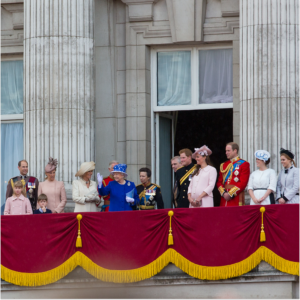16 year-old Jefferson He interviews young people on their views of the UK monarchy

June 15, 2013. Annual balcony appearance during Trooping the Colour, a ceremonial event performed every year on Horse Guards Parade in London, United Kingdom, to celebrate the official birthday of the British sovereign.
April 11, 2024
Keep or ditch the monarchy? The perspectives of young Britons
The monarchy has been a central institution in the United Kingdom with 63 monarchs spanning its 1200 years of existence. Despite the evolving nature of governance, the role of the reigning monarch remains significant as the Head of State who performs constitutional and representative duties.
In today’s constitutional monarchy, the monarch holds no political power. However, they may still have some involvement in the government.
As time passes, younger generations are moving further away from the monarchy for various reasons, including its perceived outdatedness, the belief that no single family should hold superiority over others, and concerns about their financial burden on taxpayers.
To understand why, Harbingers’ Magazine interviewed teenagers to find out their views on the debated topic.
“I view the monarchy as somewhat antiquated in today’s society. While it may have held significant relevance in the past, particularly in terms of tradition and national identity, its practical significance seems diminished in the modern era,” Isaaq Hussain, a 16 year-old UK citizen stated.
Echoing these sentiments, many young Britons interviewed by the magazine believe that the Royal Family should not be afforded any privileges in society solely based on their birth, nor should they wield power over government decisions.
“I very strongly dislike the idea that because of your birth, you are entitled more than another person,” said 16 year-old Josh Martin, a student from Reading.
Conversely, some individuals argue that, as a “symbol of British culture,” the monarchy can maintain its relevance by attracting tourists.
“International interest in the monarchy drives tourism to the UK, especially to places like Buckingham Palace,” said 16 year-old Harbingers’ Economics editor Camilla Savelieva.
Cressida Anness Lorenz, Harbingers’ International affairs editor (aged 17) also believes in the “cultural meaning” of the UK monarchy as the “UK’s history has been deeply entwined with and influenced by the monarchy.”
“The history of the monarchy raises questions about imperialism and cultural consolidation. Overall, I believe the British monarchy has a dark past and needs to address its relationship to imperialism. However, I don’t think the concept of monarchy is inherently negative,” she added, noting that the royal family often brings attention to charitable causes and pressing social issues, such as climate change.
Learn more:
A 2023 YouGov survey confirmed there is a generational gap in views on the monarchy. Among 18–24 year-olds, only 30% view the monarchy positively, while 77% of those over 65 do.
“This indicates that older generations tend to hold the institution in higher esteem, perhaps due to a stronger connection to historical narratives and traditions,” suggested Isaaq.
Isaaq’s observation resonated with sentiments shared by Josh Martin, who emphasised the impact of figures like Princess Diana in fostering public support for the monarchy. Josh noted: “When she died, there was a massive influx of love for her and the monarchy because of how much she did for the people.”
Conversely, other young individuals like Camilla feel more detached from the monarchy due to scandals involving royals like Prince Andrew, and concerns over financial allocations, particularly during economic crises.
“I believe the country’s tax money shouldn’t be allocated to them, especially given the current problems in British society, such as homelessness,” she said.
Alejandro Donnai-Jessop (aged 16) also expressed concern over financial allocations, stating that the monarchy “is using too much of the money that could be used for other things like NHS [National Health Service] deficits” and advocated for scaling back costs to improve public perception.
For Cressida, the fact that the royals live off taxpayer money, alongside their vast personal fortunes, “sends a message of unfairness to everyone struggling financially in the UK.”
She suggested that the monarchy must embrace its entire history, and address economic concerns to be accepted by young people. Meanwhile, Isaaq proposed presenting the monarchy more positively on social media to repair its relationship with the public, especially young people.
“This would not only foster a sense of connection but also ensure that the institution remains relevant and relatable in an evolving society,” he said.
While some, like Josh and Camilla, advocate for a complete separation between the monarchy and the public, arguing against special privileges and political influence, others, like Cressida and Isaaq, see the potential for the monarchy to adapt and engage with younger demographics to ensure its continued relevance.





